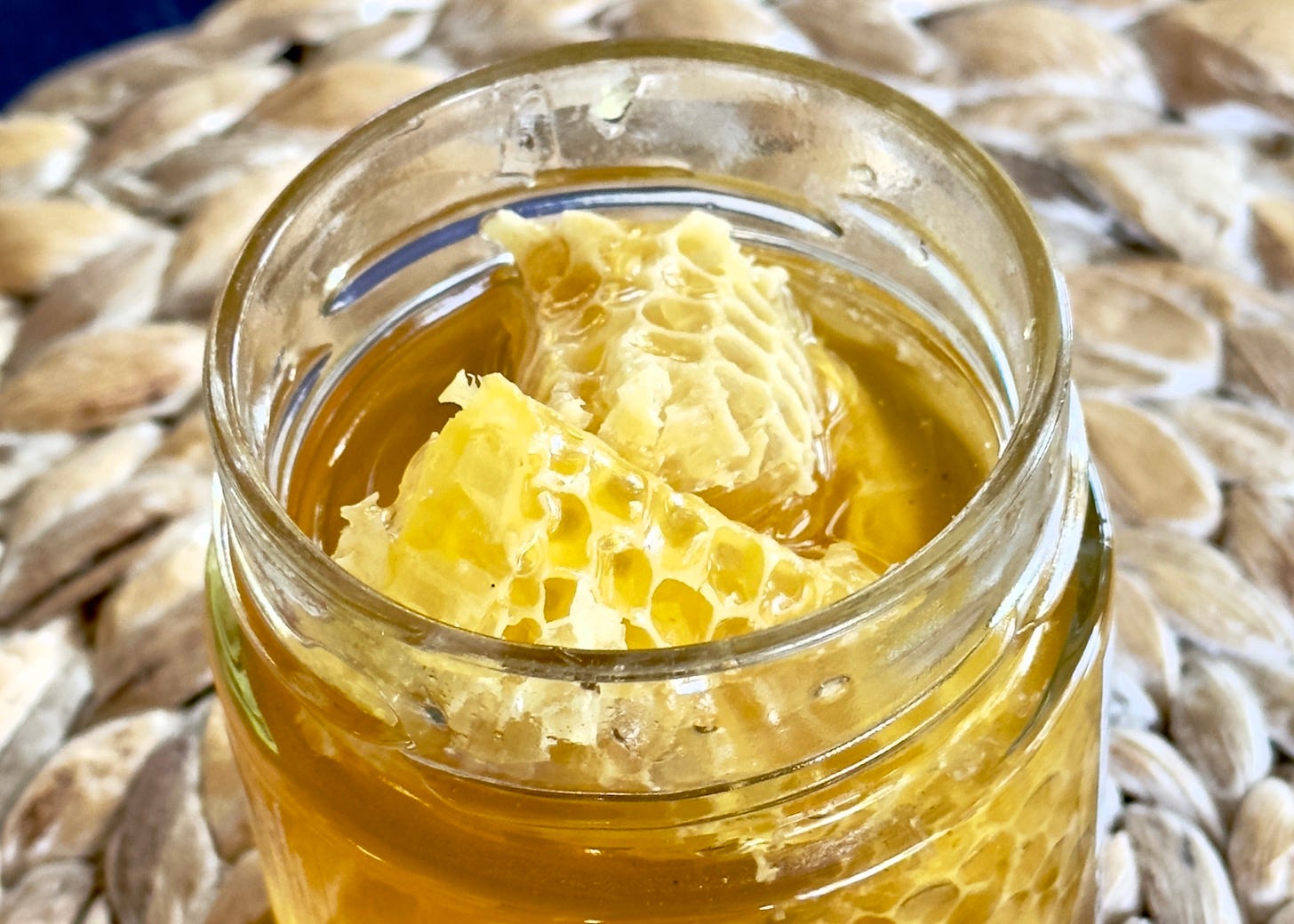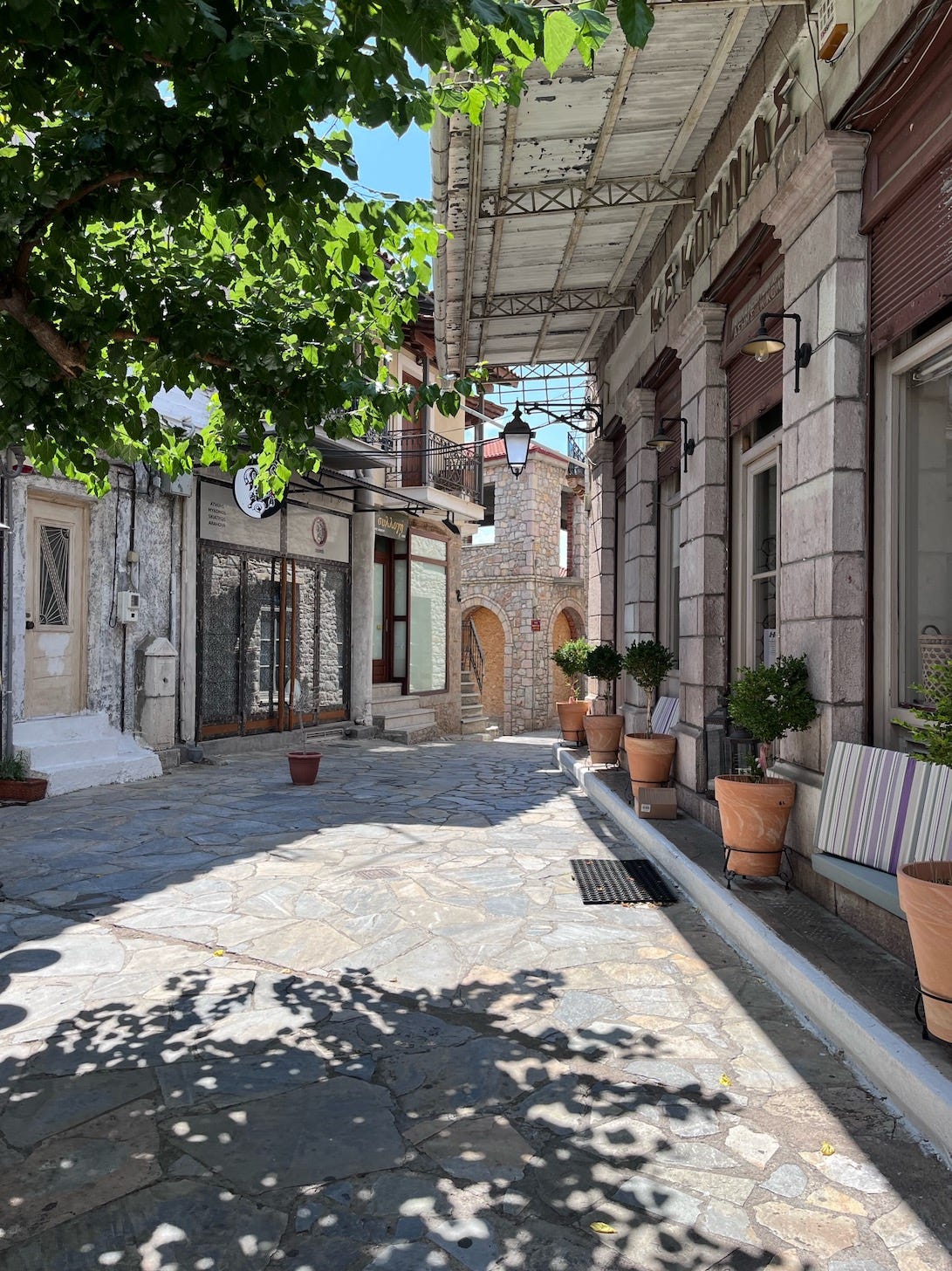The Sweet Secrets of Greek Honey
Greek beekeepers produce the world's finest and healthiest raw honey.
Nestled in the serene mountain village of Arachova, Greece, we stumbled upon a treasure trove of local culinary shops. Tasting the shops’ offerings, Greek honey stood out, surpassing all expectations of natural sweetness.
As we indulged in the village's gourmet delights, from the famed honey to the rich olive oil and fragrant mountain tea, I was pleasantly surprised to learn of the enduring tradition of beekeeping that has graced Greek culture for millennia.
From its ancient roots to its modern-day allure, Greek honey continues to captivate with its depth of flavors and potent healing promises, solidifying its place as a cherished icon of tradition and taste.
"Beekeeping is as old as Greek mythology, and recent research shows Greece has some of the greatest density of bee colonies in Europe, and the quality of their honey has been recognized internationally."
—
Netflix recently released a documentary, Live to 100: Secrets of Blue Zones. It's a fascinating watch, even if you don't want to live to 100, but strive to live healthy.
One of the Blue Zones is Ikaria, Greece, an isolated island famous for its honey and other culinary delights. Ikaria, an ancient "healing island" in the Aegean Sea, is famous for its longevity and prized honey.
Pure, unpasteurized Ikarian honey is sourced from indigenous bees gathering pollen in a pristine environment. Ikaria Greek honey is a legendary Blue Zone honey, but it’s not the only place in Greece that produces natural honey.
While Ikaria excels in beekeeping, Greece's beekeeping traditions span mountain villages and offer diverse honey flavors, such as pine, heather, and lavender.
The impact of lifestyle
On the isolated island of Ikaria, locals believe their rare honey is one of the secrets to a long life. For generations, people on the island have been eating honey to stay healthy and vigorous into old age.
Jonathan Vigliotti reported for CBS Sunday Morning,
“The locals take a teaspoon of honey as their daily medicine. The older men have rumored that it is nature's Viagra, although no studies exist. According to the University of Athens, Ikarians are twice as likely to reach their 90s, often in better health than Americans.”
Traditional Western medicine treats lifestyle diseases (atherosclerosis, heart disease, and stroke; obesity and type 2 diabetes; cancer and depression; and diseases associated with smoking, alcohol, and drug abuse) with pharmaceuticals and surgeries.
Throughout my nursing career, I've understood that prioritizing lifestyle and prevention proves superior to treatment. While pharmaceuticals address acute issues, they often fail to promote sustained long-term health.
You can't buy health; you must live it
A perfect example is the Greek-American Stamatis Moraitis, portrayed in the Blue Zones documentary, who was diagnosed with terminal lung cancer. He returns home to Ikaria to die, where he planted a vineyard to leave as a legacy to his wife, never expecting to drink its wine. Unexpectedly, his new lifestyle in his ancestral home allowed him to live another thirty years cancer-free.
His lifestyle of tending to the vineyard kept him active and outside in the sunshine. In addition, his new diet was likely high in quercetin, an abundant, potent antioxidant found in tea, wine, honey, fruits, and vegetables. Studies show quercetin has an inhibitory effect on cancer cells.
How bees make honey
Do you remember eating honeysuckle as a child?
When I was young, eating the nectar from honeysuckle flowers was a longstanding summer tradition. To get to the nectar, we plucked the flower from the stem and gently pulled the pistil out, touching the sweet bead of nectar to our tongues.
Nectar is the main ingredient of honey. Bees suck up nectar droplets from flowers and return them to the hive, converting them to honey. The bees use their wings to dry out the nectar, which turns it into honey. Once the honey has dried, the bees pack it away in hexagon-shaped honey cells and cover it with beeswax for later use.
How Greece makes honey
Bees make honey from unadulterated plants native to the high elevations of the Greek mountains. According to the Greek Reporter,
"Greek honey has long been considered the best in the world, even during ancient times, because it is pure, natural, unheated, and unpasteurized. This is due to its pure, sweet taste and proven nutritional benefits."
Greek honey is unique because of the country's biodiversity and temperate climate. Greece's wide variety of trees and flowers makes the country a playground for bees.
Without bees, life would not exist on our planet
Not all honey is created equal. Look for 100% pure, natural, unheated, and unpasteurized honey for the most nutritional benefits.
"In Greece, beehives are moved regularly from one wild place to another, giving them a constant variety of food sources. This stands in contrast to the norm in the U.S., where hives are often assigned to vast fields that grow only one crop. Another difference is that in Greece's hot, dry hills, the buds on trees and other plants develop intense aromatic qualities, and much of Greek flora is allowed to grow naturally without any laboratory breeding or pesticides."
— Dr. Pachalis Harizanis,
Critical points on Greek honey from the
interview:Chemicals and GMO (genetically modified organism) plants contribute to the collapse of bee colonies in the United States.
Greece's strict regulations against GMO crops, which contain harmful chemicals, shield its natural ecosystems. Consequently, Greece has been spared the Colony Collapse Disorder crisis that has affected the United States.
Greece has a distinctive array of flora rich in beneficial compounds, resulting in honey with unique and delightful flavors.
Greek bee hives thrive in untouched natural settings, away from the disturbances of conventional agriculture.
Unlike the static hives commonly found in the U.S., Greek beekeepers relocate their hives to ensure access to various nectar sources. This meticulous process contrasts sharply with mono-crop environments.
Greek beekeepers carefully breed queen bees that exhibit natural resistance to pests and diseases, eliminating the need for chemical interventions in hive management.
Raw honey benefits
Honey offers numerous health benefits. The Craftsmanship Podcast reports,
“Bee colonies on Mount Olypus, the mythical home of the twelve Greek gods, produce several varieties of honey that are among the most potent in the world, containing antibacterial, antioxidants and anticancer properties.”
Humans have valued honey for its nutritional and medicinal benefits for centuries. Greek honey is a complex mixture containing approximately 180 compounds with antimicrobial and antioxidant properties.
Honey contains 38-55 percent fructose and 31 percent glucose. The remaining sugars are maltose, sucrose, and other complex carbohydrates.
Honey is a naturally occurring sugar that requires metabolic breakdown before the body uses it as fuel. (Unlike high fructose corn syrup, a GMO sugar that goes straight to the liver and is stored as fat.)
From a nutritional perspective, the best honey is fresh, unheated, and minimally processed.
Honey contains the highest concentration of antioxidants, which help increase adiponectin levels. Adiponectin is an anti-inflammatory hormone known for regulating glucose levels.
When topically applied to wounds and burns, Greeks and Egyptians have used honey for its potent antibacterial and anti-inflammatory healing effects.
When added to tea, honey is also used to treat respiratory ailments like coughs and congestion.
Quercetin is the most widely distributed flavonoid in honey. Studies show that quercetin lowers blood pressure by restoring the endothelium lining of the blood vessels.
Cost of Greek honey
Greek honey is unique because it is harvested away from industrial farming. Unlike most honey in the United States, Ikarian honey is sold unheated, unfiltered, unpasteurized, and unadulterated. These processes can destroy the natural vitamins and minerals.
You may think buying Greek honey is expensive, but consider this:
ShopRite Supermarket sells a 16-ounce jar of Local Natural 100% pure wildflower honey for .75 cents per ounce.
Klio Tea sells a 16-ounce jar of Greek organic Ikaria pine wildflower honey for .64 cents per ounce.
I’m in the U.S. and used to buy Local Natural honey from ShopRite, but now I buy my Greek honey from Klio Tea. I’m sure there are many other places to buy Greek honey. Just make sure it’s genuine.
A cup of tea with honey
Honey pairs perfectly with a cup of tea. In Ikaria, herbs are used in tea and cooking as medicine. The nutritional wisdom inherent in the ingredients and recipes has kept Ikarians healthy for generations.
I frequently drink Greek Mountain Tea with Ikaria honey now. After listening to me talk about the health benefits of mountain tea and honey, my husband has dubbed it "killer mother earth tea”, meaning it's positively powerful in a good way.
References:
Kunugi H. Depression and lifestyle: Focusing on nutrition, exercise, and their possible relevance to molecular mechanisms. Psychiatry Clin Neurosci. 2023 Aug;77(8):420-433. doi: 10.1111/pcn.13551. Epub 2023 Apr 25. PMID: 36992617.
Greece Is: The Sweet Health Benefits of Bee Products
Olas B. Honey and Its Phenolic Compounds as an Effective Natural Medicine for Cardiovascular Diseases in Humans? Nutrients. 2020 Jan 21;12(2):283. doi: 10.3390/nu12020283. PMID: 31973186; PMCID: PMC7070389.
Eteraf-Oskouei T, Najafi M. Traditional and modern uses of natural honey in human diseases: a review. Iran J Basic Med Sci. 2013 Jun;16(6):731-42. PMID: 23997898; PMCID: PMC3758027.
Yang D, Wang T, Long M, Li P. Quercetin: Its Main Pharmacological Activity and Potential Application in Clinical Medicine. Oxid Med Cell Longev. 2020 Dec 30;2020:8825387. doi: 10.1155/2020/8825387. PMID: 33488935; PMCID: PMC7790550.
Abuelgasim H, Albury C, Lee J Effectiveness of honey for symptomatic relief in upper respiratory tract infections: a systematic review and meta-analysis BMJ Evidence-Based Medicine 2021;26:57-64.
Samarghandian S, Farkhondeh T, Samini F. Honey and Health: A Review of Recent Clinical Research. Pharmacognosy Res. 2017 Apr-Jun;9(2):121-127. doi: 10.4103/0974-8490.204647. PMID: 28539734; PMCID: PMC5424551.
Ahmed S, Sulaiman SA, Baig AA, Ibrahim M, Liaqat S, Fatima S, Jabeen S, Shamim N, Othman NH. Honey as a Potential Natural Antioxidant Medicine: An Insight into Its Molecular Mechanisms of Action. Oxid Med Cell Longev. 2018 Jan 18;2018:8367846. doi: 10.1155/2018/8367846. PMID: 29492183; PMCID: PMC5822819.






I just got back from Greece and have had a long time love affair with their honey. Thank you for your thorough research. I will give you a jar of rose honey when I see you!
Oh I loved reading this! I have been wanting to go to Greece and this makes me want to go even more! An added health benefit (at least in NJ) is allergy prevention, if you eat honey (or even propolis) from a hive local to you, it is supposed to help with seasonal allergies.